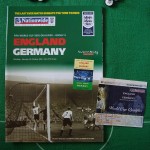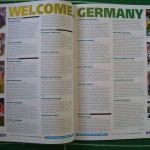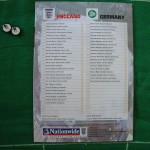FIFA World Cup Qualifying Phase
Wembley Stadium, Wembley, 07.10.2000
![]()
1-0 (1-0)
Hamann 14. / –
England: Seaman – G. Neville (46. Dyer), Keown, Adams (c), Le Saux (78. Barry) – Beckham (83. Parlour), Southgate, Scholes, Barmby – Owen, Andy Cole
Germany: Kahn – Rehmer, Nowotny, Linke – Deisler, D. Hamann, Ramelow, Ballack, Bode (87. Ziege) – Bierhoff (c), Scholl
Colours: Germany – white shirts, black shorts, white socks; England – red shirts, white shorts, red socks
Referee: Stefano Braschi (Italy)
Assistants: Gennaro Mazzei, Sergio Zuccolini (Italy)
Fourth Official: Fiorenzo Treossi (Italy)
Yellow Cards: Ballack, Nowotny / Cole
Red Cards: – / –
Attendance: 76,377
Match Programme Details
The World Cup qualifying match between England and Germany at Wembley in October 2000 was the last to be played under the famous Twin Towers, and the official match programme appropriately marks this historic occasion.
Priced at five pounds and containing fifty-six pages, the A4-sized publication features a black and white image of the first game played at Wembley against Germany in 1954; it contains a final farewell to the old stadium and pictorial memories of England v Germany games throughout the years.



Aspect: Portrait
Dimensions: 297 x 210 mm (Standard A4)
Numbered Pages: 56
Language(s): English
Match Report
Germany’s disastrous showing at Euro 2000 had predictably resulted in the end of Erich Ribbeck’s spell as Nationaltrainer, but nobody could have expected the rather soap operatic saga that would follow. No sooner had Ribbeck been shown the door an agreement was made between the DFB and Bayer Leverkusen coach Christoph Daum, only for Daum to be subjected to press rumours that he had been involved in a number of sordid activies including cocaine use. Not wanting to sever its agreement with the Leverkusen coach yet at the same time unwilling to risk employing a man who could have potentially brought disrepute to the role, striking legend Rudi Völler was employed on a temporary basis.
Although his predecessor had not provided much of a benchmark, Völler – who lacked an official coaching certificate – had started his spell in charge of the team encouragingly: a 4-1 demolition of Spain in Hannover was followed by a 2-0 success in the Mannschaft’s opening World Cup qualifier against Greece, and coming into the game against England at Wembley the mood within the team itself was far more upbeat than had been the case four months earlier in Belgium and the Netherlands.
With the widely-respected and much-loved Völler at the helm and Lothar Matthäus – whose presence had long been seen as both divisive and damaging to team morale – now retired from international duty, many of the dark clouds that had engulfed the squad at Euro 2000 had slowly began to clear. The difference was striking, more so given the fact that the team that lined up at Wembley was essentially the same as the one that had been humiliated by the second-string Portuguese in Rotterdam: Matthäus had been replaced by the recalled Carsten Ramelow, and skipper Oliver Bierhoff made a welcome return to the squad in place of the injured Carsten Jancker.
Meeting for the first time in qualifying competition since 1972, both teams lined up for what would be the last-ever game at the old Wembley stadium. After this final footballing farewell the ground would be closed and the famous twin towers demolished to make way for a more contemporary design, planned to be complete by 2003. It seemed apt that this chapter in Wembley’s long and rich history would end with a game against England’s oldest continental footballing rivals, even if the standard of both sides may not have been up to that of days gone by.
In spite of Kevin Keegan’s repeated requests for the home crowd to keep quiet during the German national anthem, there was still the predictable loud chorus of boos and whistles right from the first note – it seemed that not even a goodbye to the old Wembley could prevent the morons from having their say. Old habits die hard.
Italian referee Stefano Braschi got the game underway on what was an overcast Saturday afternoon, with the pitch surface being damp and treacherous. As had been the case in 1966, England were playing in what was their econd strip of red shirts, white shorts and red socks, with Germany in their traditional Schwarz und Weiß.
The early minutes saw the home side set the pace, with David Beckham and Paul Scholes looking to assert themselves in midfield. Germany’s first move of note came in the seventh minute, when Michael Ballack’s excellent cross from the right was expertly intercepted by Martin Keown with Oliver Bierhoff poised to strike. Much of the play was scrappy and disjointed, though this had less to do with the two teams than the conditions.
With fourteen minutes on the clock Scholes upended Ballack, and a quickly-taken free-kick from Dietmar Hamann had put the Germans in front. Taking full advantage of both the conditions and David Seaman’s lack of positioning in the England goal, Hamann struck the ball from well over thirty yards, keeping his shot firm and low. Skidding along the wet surface, the ball found the corner of the net via Seaman’s desperate left hand. It had been the only shot on target from either side in the first quarter of an hour. Having taken the lead Rudi Völler’s team continued to press, and Bierhoff was narrowly offside when put through by Carsten Ramelow. Minutes later England got their first shot on target from a Beckham free-kick, but the ball was easily collected by Oliver Kahn.
The German midfield was looking a lot sharper and committed than it had done at Euro 2000, with Hamann and Mehmet Scholl bossing the middle of the park and Sebastian Deisler providing an injection of pace down the right. In the twenty-fourth minute Scholl won another free-kick just outside the England box; Marco Bode applied the same method as Hamman had done ten minutes earlier, but his low skimming shot was neatly turned around the post by Seaman.
The remaining minutes of the half saw a number of half-chances for both sides: a curling free-kick from Mehmet Scholl was easily collected by Seaman, an on-target header from Andy Cole – seen as one of the potential long-term replacements for the recently-retired Alan Shearer – was safely held by Kahn, and a skidding shot from Carsten Ramelow after a neat cutback from Deisler didn’t quite have enough pace on it to threaten the England goal.
With half-time fast approaching, England created what was their best chance of the match. Meeting David Beckham’s pinpoint long ball into the box, skipper Tony Adams was able to get in front of a stumbling Jens Nowotny to direct a diving header low to Kahn’s right. The ball took an awkward bounce off the wet surface, but the German ‘keeper was able to keep his side in front. As the half-time whistle blew there was little doubt that Germany deserved their lead; meanwhile, the Kevin Keegan’s team were serenaded off the pitch with a volley of boos and whistles.
The second half started off with note of controversy, with Jens Nowotny returning to the field having been allegedly hit by an object thrown from the crowd. The Bayer Leverkusen defender was fine to continue, but a mark could clearly be seen on the top of his head. Nothing further would be said about the incident, but it would be just one more moment to blight what had already been a depressing forty-five minutes for keegan’s team and their increasingly impatient supporters.
England started the second half brightly, with Owen and substitute Kieron Dyer combining well to set up Cole, who was brilliantly foiled by Marko Rehmer just as he was about to pull the trigger. It was undoubtedly England’s best move of the match, but this was trumped just moments later by the fleet-footed Mehmet Scholl. Latching onto a smart Hamann pass halfway inside England’s half out on the left, Scholl weaved and jinked his way into the box and then past a static Adams and Keown before unleashing a firm left-foot shot that was brilliantly parried by Seaman. With the men in red all over the place, Bierhoff was too close to the England ‘keeper to latch onto the rebound, and the ball was desperately hacked away by left-back Graeme le Saux.
With just under an hour gone England came close yet again: given way too much space outside the German box, David Beckham launched a brilliant effort that was brilliantly tipped over the bar by Oliver Kahn. England were pressing forward effectively, and were starting to put together a number of decent moves down the flanks; the Germans on the other hand appeared to have lost some of their poise and control in midfield, with a number of passes going astray.
England came close once again when Beckham flash another show narrowly wide of the post, but when play swung to the other end Germany could very well have sealed the match had conditions been more helpful. In what was a swift move down the right flank, Michael Ballack picked up the ball deep inside his own half before finding Mehmet Scholl and carrying on his run. Scholl played a neat return pass, and Ballack – who had charged almost the full length of the pitch – played the perfect ball into the England box. The chance would fall to Jens Nowotny, who was defeated by the awkward bounce of the ball with the net at his mercy. Had the conditions been a little friendlier, Nowotny – not a bad finisher by any means – would have almost certainly finished England off.
With four minutes left Christian Ziege came on for Marco Bode, and as the final whistle approached Germany had yet more chances to seal the match, first through Oliver Bierhoff whose first touch let him down after a great pass from Didi Hamann, and then Sebastian Deisler who blasted his shot high over the bar after the marauding Nowotny had covered almost the full length of the pitch to set up the chance. The last touch of a football would fall to goalscorer Hamann, and when the final whistle blew England’s last occasion in front of the twin towers was over.
As well as being England’s final match at the old Wembley, it would also be Kevin Keegan’s final match as coach. Heavily soaked by the rain and with a face as long as the stadium’s illustrious history, the writing was pretty much on the wall as he trudged off to a chorus of jeers from the crowd. Keegan would resign immediately after the match to be be replaced on a temporary basis by Under-21 coach Howard Wilkinson, who would then keep the seat warm for Swede Sven-Göran Eriksson – the first non-native to fill the role.
The England team had hoped to sign off this chapter in the history of Wembley Stadium with a farewell victory, but once again eleven men from Germany had proved to be the ultimate party-poopers. Including their penalty shootout victory in 1996, it was the Mannschaft’s fourth win in succession at the ground against the home side – a sequence that stretched back twenty-six years. In winning what was clearly their most testing away fixture in the group Rudi Völler’s side had clearly seized the initiative in the race for the one guaranteed qualification spot, an advantage they maintained until the two teams would meet again the following autumn in Munich. However, in what would be the final international to be played at the Olympiastadion, things would be very different.
Cumulative Record
Home: played 11, won 3, drawn 3, lost 5. Goals for 16, goals against 25.
Away: played 11, won 5, drawn 0, lost 6. Goals for 11, goals against 25.
Neutral: played 6, won 3, drawn 1, lost 2. Goals for 6, goals against 8.
Overall: played 28, won 11, drawn 4, lost 13. Goals for 33, goals against 58.
Competitive: played 10, won 6, drawn 2, lost 2. Goals for 13, goals against 11.
